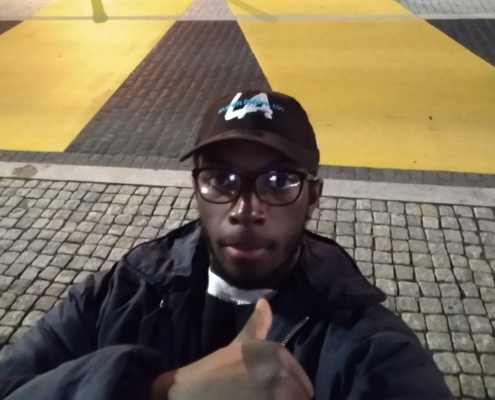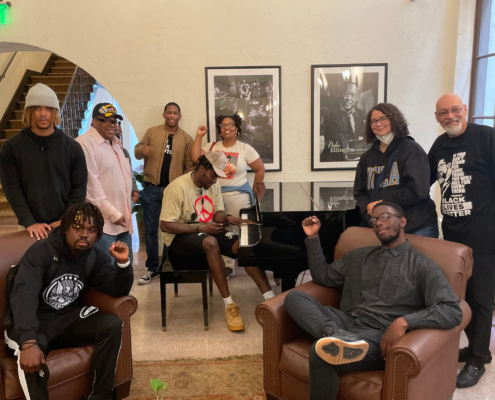Freedom Fellow shares experience in Black Labor organizing and fellowship journey
Kenneth Callahan discusses his time as a We Gon’ Be Alright student and shares his experience as a Freedom Fellow below.
Simone Frank | February 7th, 2023
From the city of Inglewood, California, meet Kenneth Callahan who is a junior transfer student at UCLA double majoring in Psychology and Labor Studies. Before completing his studies at Los Angeles City College, Kenneth’s passion for labor justice and worker rights expanded as he had the opportunity to participate in the joint UCLA x LATTC course We Gon’ Be Alright which led to his involvement in the Freedom Fellowship summer program.
For students in the Center for Advancement of Racial Equity (CARE) at Work’s Freedom Fellowship 2022, learning about Black worker justice is just the beginning for a lifetime of empowerment.
Launched in the summer of 2021, the Freedom Fellowship offers an experiential learning opportunity that aims to build a bridge between students, labor leaders, union members, and field organizers in partnership with the Southern California Black Worker Hub and CARE at Work’s regional Black Worker Center (BWC) allies.
Below, Callahan dives deeper into reflecting upon his valuable experience participating in the Freedom Fellowship and CARE at Work’s cross-campus course, We Gon’ Be Alright: Developing the Next Generation of Black Organizers.
What drew you to want to learn about Labor Justice and enroll in the We Gon’ Be Alright Class?
Labor justice wasn’t on my plate when I first enrolled in the class. Beyond the Kendrick Lamar song, I was interested in just learning about another Black history class which is something that I’ve talked about in the past on Black labor movements; especially since I just got out of the CCCP+ site program, and took a different UCLA class there, I wanted to get another chance to enroll in a UCLA class before I transferred. It was like killing two birds with one stone where I got to enroll in a class and a topic that I was interested in, which was, Black history and Black Studies, and also get another opportunity to experience a UCLA class. It was beneficial for me because coming from a community college background, you have this impression that once attending a UC or CSU university, all the classes will be incredibly difficult or impossible for you. But this class helped me feel confident in my academic ability and goals while giving me the resources to transition smoothly to a four-year institution.
What are some of the major lessons you gathered from the course?
A major lesson from this course is the importance of organizing and the deep connective history it has with the Black community. Diving into the background of the leaders that helped shape this field, something I thought was particularly special in this course was learning the tenets of true community engagements. This was especially important for me because as a student leader, you’re often working with campus and city decision-makers so it’s easy to get caught up in your own perspective of what the community needs. As a leader, organizer, or activist, it’s important for us to remember who’s being affected by the decisions that we make. For example, if we look at student activism, we have to recognize that the policy changes we fight for as student leaders can affect our school district as a whole. The changes we champion must be centered on addressing the issues of those affected most, our underprivileged student peers. Looking at the broader movement, we must create a pathway where the most affected can share their issues while leaders listen and engage.
What was it about the class that made you want to become a Freedom Fellow?
What made me want to become a Freedom Fellow were the instructors who helped shape the class. Being around them and engaging in the work via our class projects and guest speakers inspired me. The insights I gathered in this space motivated me to want to engage further, so I saw the opportunity of working with the Black Worker Center as a game changer.
The fellowship was an actual opportunity for me to go out and use the things I learned with the class to apply to something meaningful. I don’t necessarily have to wait another two and a half years before I have a degree to go out in the community and do something; I can do something now. Being able to use this experience as a way to see what I can accomplish in the future was a big part of my decision. And the fact there was a solid pathway set up for me to get into the field, support the movement, and gain mentorship and professional opportunities made me want to pursue the program.
Give us some context behind your time as a fellow. Where did you work and what were your responsibilities?
I was working as a fellow with the Los Angeles Black Worker Center (LA BWC), which is located in South LA. Most of my time as a fellow was spent doing community outreach, engaging in campaign planning meetings, and participating in the Center’s coalition-building development. It was great to be behind the scenes, take in the whole process, and see how the work was done.
While supporting some of the LA BWC’s canvassing efforts, I learned helpful strategies for effective public dialogue and connected with various Black Angelenos regarding the Center’s current projects and priorities. This chance to improve my public speaking and communication skills was incredibly valuable. Additionally, while assisting with one of the LA BWC’s emerging projects, I got to do research and project development for a new worker education program.
What did you enjoy the most about the fellowship?
I enjoyed everything about the fellowship but being able to come together as a cohort to talk about our different lived experiences and exchange insights from our work at the various Black Worker Centers was particularly special. At my site, I loved the work I did. Canvassing and being able to be out in the community was helpful for my growth as an organizer.
A part of the fellowship that I also enjoyed was the New Power Project Seminars. It was interesting to interact with another cohort of fellows similarly passionate about social justice but from an immigrant justice lens. As someone with little experience with immigrant rights work, I feel like I got to learn so much about the lived experiences of my fellow Black immigrant brothers and sisters. It was intriguing to engage the other fellows via our seminar exercises and dialogues. Being born in the United States, we often forget the privileges we benefit from. These seminars exposed me to the different perspectives across the diaspora and allowed me to learn more about the struggles of the Black Immigrant community. Overall, getting to work with some of the program coordinators was truly an awesome experience.
Any words of advice for others interested in enrolling in the We Gon Be Alright class or participating in the Freedom Fellowship?
Make the most of your class experience — stay engaged! Ask questions and be curious because you never know who you’ll talk to. A once-in-a-lifetime experience, the class and fellowship offer opportunities to connect with a wide base of leaders actively shaping labor in California and beyond in the Black Labor Justice Movement. And as for the fellowship, don’t miss out on that opportunity! The key difference between the class and the fellowship was the chance to dive deeper into work with the Black Worker Centers. Working directly under the mentorship of the worker center’s best and brightest, I got to expand my network and build helpful connections for my career. Ultimately, I feel like I’ve built strong relationships by taking the class and fellowship and learning the critical skills necessary to start my movement.
The 2023 Freedom Fellowship beginning in July 2023 will be offered exclusively to students who have taken We Gone Be Alright: Developing the Next Generation of Black Worker Organizers. We Gon’ Be Alright is a joint UCLA Labor Studies and LACCD Course (UC Transferable) that will focus on the tenets of hands-on community organizing and aims to give students an in-depth look at the historical and modern efforts of the Black Worker Justice Movement.
If you are interested in learning more information about UCLA CARE at Work, “We Gone Be Alright: Developing the Next Generation of Black Organizers”, or the Freedom Fellowship, please sign up for the Virtual Open House on Monday, February 13th, 6:00pm (virtual) through the registration link.
Enrollment for this course will be through the instructor’s consent. Please complete the interest form to be considered for this course.
Media Contact
Marcos Ruiz Rojas
marcosruiz1999@ucla.edu



